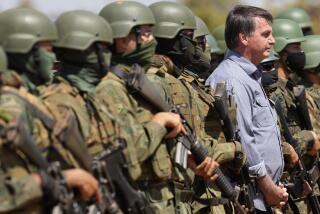Leave Islamabad to Sort Out Its Own Mess
- Share via
Pakistan’s troubled history turned a new chapter Tuesday with the dismissal of another civilian government. However, the central question emerging from the latest army coup is not whether democracy was disrupted again or whether human rights will be preserved under a martial law administration. It is whether Pakistan’s current realities demand that an elected civilian despot be replaced by authoritarian rule to ensure the stability of the Islamic world’s only nuclear-capable state. Perhaps in the process, a framework also can be found for reinvigorating Pakistan’s democratic institutions.
For nearly a decade, American lawmakers, nonproliferation strategists and human rights advocates have struggled to develop a set of policy tools for dealing with Pakistan’s dysfunctional nuclear democracy. Their record is dismal.
Five elected civilian governments have fallen since 1988. All five failures are the result of fundamentally irreversible trends fostered by past and present U.S. policy. The first of these trends, the rise of Islamic radicalism within Pakistan’s civilian and military ranks, is the result of a mismanaged U.S. exit from Afghanistan and Pakistan in 1990.
Imposing U.S. economic and military sanctions against Islamabad in 1990 for its unbridled nuclear ambitions--ambitions seeded by U.S. anti-communist policy paradigms during the Afghan resistance--eliminated critical military training programs and other tools that constructively engaged Pakistan’s army on its expected role within democracy’s framework.
Repeatedly turning a blind eye to the corruption and cronyism that characterized both the Nawaz Sharif and Benazir Bhutto governments ensured economic collapse in Pakistan. Loans from the World Bank and the International Monetary Fund were either siphoned off to Swiss bank accounts or used to pay interest on previous loans. Ordinary Pakistanis never saw the benefit of billions in U.S. taxpayer dollars arriving on their shores--a key factor in the anti-U.S. sentiments expressed on Pakistan’s streets during the past decade.
Then there was the nuclear problem. Islamabad’s drive to acquire nuclear weapons and missile delivery systems had strategic and Islamic roots. The Islamic roots have vexed U.S. policymakers immeasurably and drive fears in the West that a Pakistan under army rule might share its nuclear technologies with militant anti-Western states in exchange for financial assistance.
In an ideal democracy, such technology transfers could not take place without thoughtful debate and earnest consideration of the larger strategic consequences. Yet Pakistan was not a democracy under Sharif or Bhutto.
The American people need to understand that Pakistan’s blend of feudal politics and Islamic militarism have trampled human rights and bankrupted its economy under military dictators and civilian autocrats alike. What is required in Pakistan is a breather from its polluted brand of democracy, not an immediate return to it. An administration of technocrats backed by the still-respected army should undertake fundamental reforms over a two- to three-year period that ensure the longer-term survival of a true democracy.
First, Pakistanis must revoke the feudal system of land holdings, as India did shortly after independence. India restricted land ownership to 10-acre parcels to ensure more equitable distribution. Pakistan should offer a similar solution, with the backing of the army, so feudalism stops breathing life into Islamic fundamentalists’ protests against the social injustice it purveys.
Second, the interim technocrats must enact tax reform. Only 1 million of Pakistan’s 140 million people pay taxes. Wealthy land barons and feudal landlords never have paid taxes. One way of recouping lost revenue without appearing coercive would be to create a national investment program that provides incentives for repatriating capital held abroad. Doing so might remove another inequity feeding the rallying cries of Islamic fundamentalists.
Finally, the army is the only institution that can enact electoral reforms. Pitifully few Pakistanis vote (less than 17% of the general population in the last election), and most elections, including Sharif’s landslide 1997 victory, are bought at the polling booths with graft. The army should conduct a census, register voters and enact strict spending limits on public campaigns. Perhaps Islamic radicalism from neighboring Afghanistan would never have reared its ugly head on Pakistan’s streets if more Pakistani citizens believed that their votes mattered.
The United States should now sit quietly while Pakistan sorts out its own mess. The time for intervention has passed. Pakistan’s army generals must understand the enormous responsibility and complex task they face in reforming Pakistan. Ordinary Pakistanis, who have suffered the repeated insults of their leaders taking them for fools while they were robbed blind, deserve a way of life free of corruption, despotic rule and dysfunctional democracy.
More to Read
Sign up for Essential California
The most important California stories and recommendations in your inbox every morning.
You may occasionally receive promotional content from the Los Angeles Times.










